Cossacks in World War 1812 of the year. Part II. The invasion and exile of Napoleon
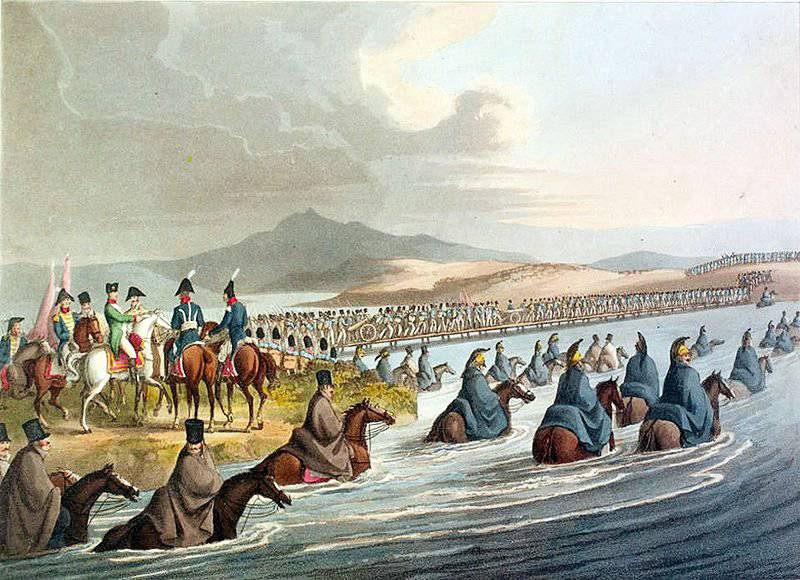
Fig. 1 The Great Army Crossing over the Neman
Napoleon’s invasion of Russia forced the Russian people to exert all their forces to repel the aggressor. The Cossacks also took the most active part in the Patriotic War and fought with the tension of all forces. In addition to the numerous regiments guarding the extended borders of the empire, all the available forces of the Don, Ural and Orenburg Troops were mobilized and put up for the war against Napoleon. The Don Cossacks bore the brunt of the blow. The Cossacks from the first days began to inflict tangible injections to the Great Army, which became more and more painful as it moved deeper into Russian lands. From July to September, that is, the entire time of the Napoleonic army, the Cossacks continuously participated in rearguard battles, inflicting significant defeats on the French. Thus, Platov’s corps during the retreat from the Neman covered the junction of the 1 and 2 armies. Ahead of the French troops was the Polish Uhlan division of Rozhniec. On July 9, at a place with the symbolic name of Mir, the Cossacks of Platov used their favorite Cossack tactical device - Venter. A small detachment of Cossacks imitated a retreat, lured the Uhlan division into a ring of Cossack regiments, which they then surrounded and defeated. 10 July was also defeated by the vanguard of Jerome Bonaparte - King of Westphalia. Since July 12, the Platov Corps acted in the rear of the Davout Corps and the main army of Napoleon. The maneuver of Napoleon to divide the Russian army and defeat them individually failed. On August 4, the armies were united at Smolensk, and on August 8, Prince Golenishchev-Kutuzov was appointed commander-in-chief. On the same day, Platov defeated the vanguard of Murat’s corps near the village of Molevo Marshes.
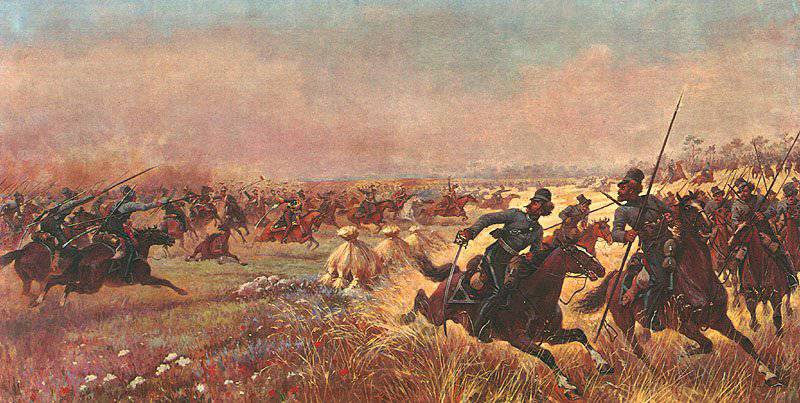
Fig. 2 Cossack Venter under the World
During the retreat of the Russian army, everything was destroyed: residential buildings, food, fodder. The environs along the path of Napoleon’s army were under the constant supervision of Cossack regiments, which prevented the French from obtaining food for the troops and forage for horses. It should be said that Napoleon before the invasion of Russia printed a huge number of Russian banknotes of excellent quality. Among the merchants, peasants and landowners were "hunters" to sell the French food and fodder for a "good price." Therefore, the Cossacks, in addition to military affairs, throughout the war also had to protect the irresponsible part of the Russian philistine from the temptation to sell the French food, fuel and fodder for "good money". Napoleon organized the main intendanism of his army in Smolensk. As deepening into the borders of Russia, the supply routes between the intendanism and the army increased and the Cossack cavalry attacked. 26 August Borodino battle took place. Cossack regiments were reserve army and provided the flanks. For health reasons, Platov did not participate in the battle. At the critical moment of the battle, the consolidated Cossack corps, commanded by General Uvarov, raided the rear of the left flank of the French army and defeated the rear. To eliminate the threat, Napoleon threw a reserve against the Cossacks instead of the last decisive attack. This prevented an unfavorable outcome for the Russians at the crucial moment. Kutuzov was counting on more and was unhappy with the results of the raid.
After the battle of Borodino, the Russian army left Moscow and blocked the way to the southern provinces. Napoleon’s army occupied Moscow, the Kremlin turned into Napoleon’s headquarters, where he was preparing to accept peace proposals from Alexander. But the parliamentarians did not appear, Napoleon's troops were under siege, because the immediate vicinity of Moscow was occupied by the Russian cavalry. The area adjoining Moscow from the west, northwest, north and northeast was in the zone of action of the Separate Cavalry Corps of the curtain of Major General and Adjutant General, and from September 28 Lt. Ferdinand Wintsentrorode. The veil forces operated at different times until: 36 Cossack and 7 cavalry regiments, 5 individual squadrons and a team of light horse artillery, 5 infantry regiments, 3 jury battalion and 22 regimental guns. The guerrillas ambushed, attacked enemy carts, intercepted couriers. They daily reported on the movement of enemy forces, transferred captured mail and information received from prisoners. The corps was divided into partisan detachments, each of which controlled a specific area. The most active were detachments under the command of Davydov, Seslavin, Figner, Dorokhov. The tactical basis of the partisan actions consisted of tried and tested Cossack intelligence, Cossack patrols and Becket (outposts), deft Cossack Venter (fraudulent and double ambushes) and fast rebuilds in the lavas. The guerrilla unit consisted of one or three Cossack regiments, reinforced by the most experienced hussars, and sometimes rangers, or arrows - light infantrymen, trained in loose-field operations. Kutuzov also used mobile Cossack detachments for reconnaissance, communications, guarding the supply lines of the Russian troops, attacking the supply lines of the French army, and performing other special tasks in the rear of Napoleon’s army and on the tactical subfield to the north of the Main Russian Army. The French could not leave Moscow, fires began in the city itself. The arsonists were grabbed, brutal reprisals were carried out on them, but fires intensified and cold weather set in.
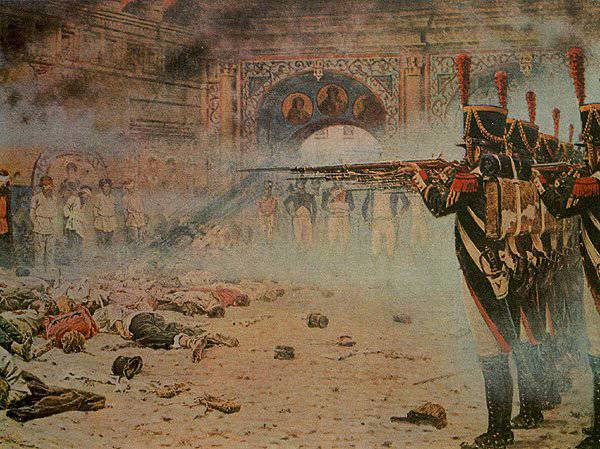
Fig. 4 Shooting the arsonists in Moscow
The ataman on Don in the absence of Platov was General Denisov. He announced a total mobilization from 16 to 60 years. 26 new regiments were formed, which in September all approached the Tarutino camp and richly replenished the troops of the veil. Kutuzov called this event a “noble replenishment from the Don”. In total, from the Don was put up in the army of 90 regiments. Cossacks and units of the regular light cavalry Moscow was blocked. Moscow was burning, the means for feeding the occupying army in the field were impossible to get; communications with the main quartermaster base in Smolensk were threatened by Cossacks, hussar regiments and partisans from the local population. Every day the Cossacks and partisans captured hundreds, and even thousands of enemy soldiers who had broken away from their units, and sometimes whole units of the French were smashed. Napoleon complained that the Cossacks "plundered" his army. Napoleon’s hope for peace negotiations remained futile.
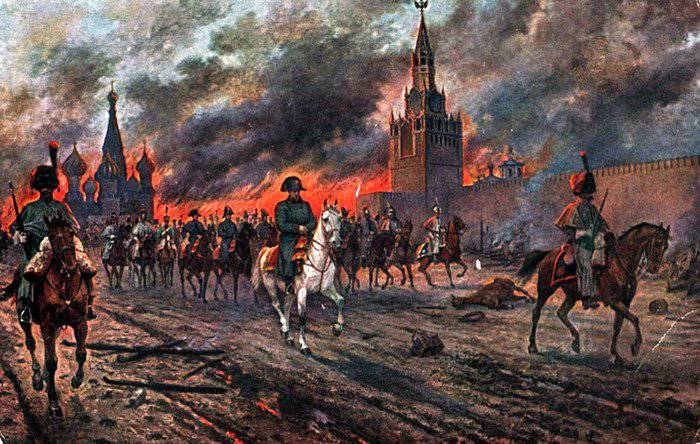
Fig. 5 Fires in Moscow
At the same time, the Russian army, having retreated to Tarutin, got up on the roads to the rich food southern provinces, untouched by the war. The army was continuously replenished, put itself in order and established communication and interaction with the armies of Chichagov and Wittgenstein. The Cossack Corps Platov was at Kutuzov's rate as an operational and mobile reserve. Meanwhile, Emperor Alexander made an alliance with the Swedish king Bernadotte and the Swedish army landed in Riga, reinforcing the army of Wittgenstein. King Bernadot also helped to settle tensions with England and form an alliance with her. The army of Chichagov joined the army of Tormasov and threatened Napoleon’s communications to the west of Smolensk. Napoleon's army was stretched along the Moscow-Smolensk line, in Moscow there were only 5 corps and guards.
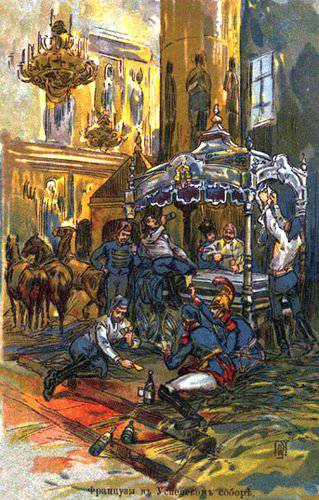
Fig. 6 French in the Assumption Cathedral of the Kremlin
Directly opposite the Tarutinsky camp was the corps of Murat, who led the sluggish battles with the Cossacks and cavalry. Napoleon did not want to leave Moscow, because it would show his failure and an error in the calculations. However, the hungry and cold position in Moscow and on the Moscow-Smolensk line, which was continuously attacked by the Russian cavalry, all this raised the question of withdrawing the army from Moscow. After much deliberation and advice, Napoleon decided to leave Moscow and speak at Kaluga. October 11 old style Napoleon ordered the abandonment of Moscow. The corps of Ney, Davou, Beogarna, headed towards Kaluga. With corps moving a huge wagon train with refugees and looted property. On October 12, the corps of Platov and Dokhturov quickly overtook the French, blocked their path at Maloyaroslavets and managed to keep it until the main forces approached. Moreover, during the night raid on the left bank of the river Luz, Cossacks almost captured Napoleon himself, darkness and chance saved him from it. The heroic defense of Maloyaroslavets, the approach of the main Russian forces, the shock of the real possibility of being taken prisoner prompted Napoleon to stop the battle and give the order to the army to retreat towards Smolensk. In Moscow, with small parts remained Berthier, who had the task of blowing up the Kremlin, for which all of its buildings were mined. When this became known, General Wintzengerode arrived in Moscow with an adjutant and Cossacks for negotiations. He informed Berthier that if this was done, all the captured French would be hanged. But Berthier arrested the parliamentarians and sent to the headquarters of Napoleon. The body of the veil was temporarily headed by a Cossack general Ilovaisky. With the departure of the French followed terrible explosions. But due to the oversight of the French and the heroism of the Russian people, many barrels of gunpowder were not set on fire. After leaving Moscow, General Ilovaisky with the Cossacks were the first to occupy Moscow.
The retreating army of invaders came out of Mozhaisk passed the Borodino field, covered up to 50 thousands of corpses and the remains of guns, wagons and clothing. Flocks of birds pecked at the corpses. The impression for the retreating troops was terrifying. The pursuit of the invaders was conducted in two ways. The main forces, led by Kutuzov, went along a parallel Smolensk road, northward between the main Russian and French forces was the lateral vanguard of General Miloradovich. North of the Smolensk road and parallel to it, a detachment of Kutuzov Jr. was moving, squeezing parts of the foe from the north. The direct pursuit of the French army was entrusted to the Cossacks Platov. On October 15, the corps of Berthier and Poniatowski, which left Moscow, joined the main French army. Cossacks Platov soon overtook the French. In addition, several mobile units consisting of Cossacks and hussars, which continuously attacked the retreating columns of the invaders, were formed from the curtain troops, and again the most active were under the command of Dorokhov, Davydov, Seslavin and Figner. The Cossacks and partisans were tasked not only to pursue and pester the enemy on the march, but also to meet its head units and destroy their ways, first of all, the ferry. Napoleon's army sought the fastest transitions to reach Smolensk. Platov denounced: “the enemy is running as never before, no army could retire. He throws all the burdens on the road, the sick, the wounded, and no feather of the historian is able to depict the pictures of horror that he leaves on the high road. ”
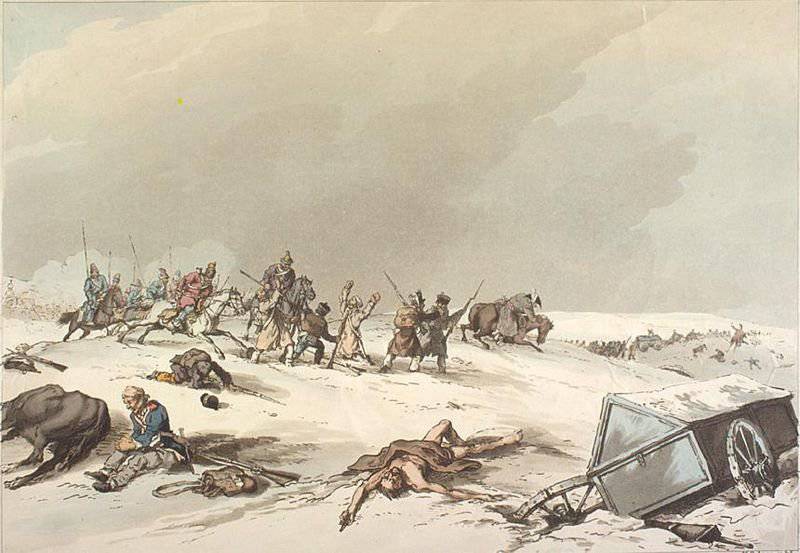
Fig. 7 Cossacks attack retreating French
Nevertheless, Napoleon found the movement not fast enough, blamed the rearguard troops of Davout for this and replaced them with Nei’s corps. The main reason for the slow movement of the French was the Cossacks, who constantly attacked their marching columns. The Cossacks of Platov delivered prisoners in such numbers that he reported: “I’m forced to give them to the townsfolk in villages for their transmission”. Under the Vyazma Corps, Davout again fell behind and was immediately attacked by Platov and Miloradovich. Poniatowski and Beauharnais turned their troops and rescued Davout's corps from complete annihilation. After the battle of Vyazma, Platov with 15 regiments went north of the Smolensk road, the corps of Miloradovich with the Cossacks of the Orlov-Denisov corps moved south of the retreating French. Cossacks walked along lanes, were ahead of parts of the French and attacked them from the head, where they were least expected. October 26 Orlov-Denisov, connecting with the partisans attacked the divisions from the corps of Augereau, who had just arrived from Poland to replenish and forced them to surrender. On the same day, Platov attacked the corps of Beauharnais while crossing the river Vopi, brought him to full incapacity and beat off the entire train. General Orlov-Denisov, after the defeat of Augereau, attacked the warehouses of the French military supplies near Smolensk and captured them and several thousand prisoners. The Russian army, pursuing the enemy along the ruined road, also suffered shortcomings in food and forage. Troops transports did not ripen, the five-day reserves taken in Maloyaroslavets were spent and there was little opportunity to replenish them. Supplying the army with bread lay on the population, with every inhabitant it was necessary to bake 3 bread. October 28 Napoleon arrived in Smolensk, and parts came up within a week. No more than 50 thousand people reached Smolensk, no more than 5 thousand cavalry. The reserves in Smolensk, due to the attacks of the Cossacks, turned out to be insufficient and the warehouses were crushed by demoralized hungry soldiers. The army was in such a state that it was not even necessary to think about resistance. Through 4 of the day, the army launched 5 from Smolensk in columns, which made it easier for the Russian troops to destroy them in parts. To complete the setbacks of the French army at the end of October, severe cold began. The hungry army also began to freeze. Stepan Panteleev's Don Cossack Regiment went into a deep raid, tracked down his captured comrades and on November 9 after a hard raid Ferdinand Wintsentrorode and other prisoners were freed near Radoshkovichi 30 versts from Minsk. The vanguard of Miloradovich and the Cossacks of Orlov-Denisov cut the way to Orsha near the village of Krasny to the French. The French began to accumulate near the village, and Kutuzov decided to give battle there and sent additional forces. In the three-day battle of Red, Napoleon’s army, in addition to the dead, lost up to 20 thousands of prisoners. The battle was led by Napoleon himself, and all the responsibility was on him. He lost the aura of the invincible commander, and his authority fell in the eyes of the army. Speaking from Maloyaroslavets with the 100 army of the thousandth and absorbing guard garrisons along the way, after the Red Army he had no more than 23 thousand infantry, 200 man of cavalry and 30 guns. The main goal of Napoleon was a hasty exit from the ring surrounding troops. The corps of Dombrovsky had already with difficulty restrained Chichagov’s army, and the corps of Macdonald, Udinot and Saint-Cyr were thoroughly battered by the replenished army of Wittgenstein. In mid-November, Napoleon’s army arrived in Borisov for the crossing. On the opposite bank of the Berezina was Chichagov's army. To mislead him, engineering parts of the French began to build ferries in two different places. Chichagov focused at the bridge Uholod, but Napoleon threw all his strength to the construction of bridges at Studenka and began crossing the army. Parts of Platov began a battle with the French rearguard, knocked him over and bombarded the bridges. In an effort to avoid a breakthrough of the Cossacks on the west bank, the French sappers blew up the bridges that had survived the shelling, leaving behind the rearguard units to their fate. Chichagov, realizing his mistake, also arrived at the crossing. The fight boiled on both banks of the Berezina.
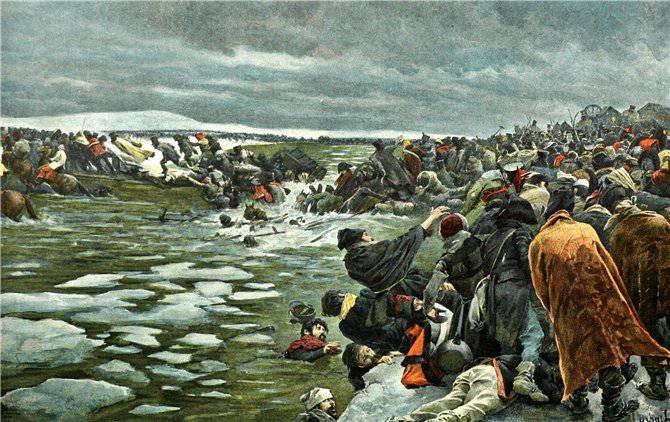
Fig. 8 Berezina
After the defeat at Berezina 10 December, Napoleon arrived in Smorgon and from there went to France, leaving the remnants of the army at Murat's disposal. Leaving the army, Napoleon did not yet know the full extent of the disaster. He was confident that the army, having moved to the borders of the Duchy of Warsaw, where there were large reserves, would quickly recover and continue the war against the Russian army. Summing up the military failure in Russia, Napoleon saw them in that his calculation of a peace treaty after the occupation of Moscow turned out to be erroneous. But he was sure that he was wrong not politically and strategically, but tactically. The main reason for the death of the army, he saw that he gave the order to retreat with a delay of 15 days. He believed that if the army had been withdrawn to the limits of Vitebsk before the cold weather, Emperor Alexander would have been at his feet. Napoleon low valued Kutuzov, despised his indecision and unwillingness to engage in battle with the retreating army, besides dying from hunger and cold. Napoleon saw an even bigger mistake and inability of him in that Kutuzov, Chichagov and Wittgenstein allowed the remnants of the army to cross the Berezina. Napoleon attributed much blame for the defeat to Poland, whose independence was one of the goals of the war. In his opinion, if the Poles wanted to be a nation, they would have completely rose against Russia. And although every fifth soldier of the Great Army of the invasion of Russia was a Pole, he considered this contribution insufficient. It must be said that most of these Poles (as well as other soldiers of the Great Army) did not die, but were captured, and a significant part of the prisoners, at their request, was later turned into the same Cossacks. According to many historians of the war with Napoleon, in the end his Great Army "emigrated" to Russia. In fact, the imposition of a “captive Lithuanian and Nemchury” to the Cossacks with their subsequent departure to the east was commonplace at all times of the centuries-old Russian-Polish-Lithuanian confrontation.
During the war, Napoleon completely revised his attitude to the military art of the Cossack troops. He said that “it is necessary to give justice to the Cossacks, it was they who brought the success of Russia in this campaign. Cossacks are the best light troops among all existing ones. If I had them in my army, I would have gone with them the whole world. ” But the main reasons for his defeat Napoleon did not understand. They were covered in the fact that Napoleon did not take into account his own forces in relation to the space of the country and the forms of warfare in these spaces by its people from deep antiquity. In the endless expanses of the East European plain, the huge Persian army of King Darius and the equally huge Arab army of Marwan were once destroyed. They were exhausted and exhausted by spaces, not seeing the enemy and not being able to destroy him in open battle. In such conditions, the army of Napoleon. He had only 2 major battles, near Smolensk and at the Borodino field near Moscow. The Russian armies were not crushed by him, the results of the battles were controversial. The Russian armies were forced to retreat, but did not consider themselves defeated. Within the limits of vast spaces, from ancient times, the best qualities of light Cossack cavalry manifested themselves. The main methods of fighting the Cossack units were ambush, raid, hinterland, and lava, perfected by the once great Genghis Khan, then inherited by the Cossacks from the Mongolian cavalry and not yet lost their value by the beginning of the XIX century. The brilliant victories of the Cossacks in the war against Napoleon attracted the attention of all of Europe. The attention of European nations was drawn to the internal life of the Cossack troops, to their military organization, to training and economic structure. Cossacks in their everyday life combined the qualities of a good farmer, cattle farmer, business executive, they lived comfortably in the conditions of people's democracy and, without looking up from the economy, could maintain high military qualities in their midst. These successes of the Cossacks in the Patriotic War played a cruel joke in the theory and practice of European military construction and over the entire military organizational thought of the first half of the 19th century. The high cost of numerous armies, which tore off large masses of the male population from economic life, once again aroused the idea of creating an army on the model of Cossack life. Landwehr, landsturm, Volkssturm and other types of militia began to be formed in the countries of the Germanic peoples. But the most stubborn implementation of the organization of the army on the Cossack model was manifested in Russia and most of the troops, after World War II, was turned into military settlements for half a century. But "what is allowed to Jupiter is not allowed to the bull." Once again, it was proved that it is impossible by an administrative decree to turn men into Cossacks. Through the efforts and efforts of the military settlers, this experience turned out to be extremely unsuccessful, the productive Cossack idea was turned into a parody and this military-organizational caricature became one of the weighty reasons for the defeat of Russia in the subsequent Crimean War. However, the war with Napoleon continued and during the war the Cossacks became synonymous with valor not only in Russia, but also among the allied armies of European nations. After another defeat of Napoleon’s army at the crossing of the Berezina River, the pursuit of his troops continued. Army advancing 3 columns. Wittgenstein walked to Vilna, in front of him was Platov's corps from 24 Cossack regiments. Chichagov’s army marched on Oshmyany, and Kutuzov with the main forces on Troki. 28 November Platov approached Vilna and the very first shots of the Cossacks made a terrible stir in the city. Murat, left by Napoleon to command the troops, fled to Kovno, the troops went there too. On the march, in the conditions of terrible icy conditions, they were surrounded by Platov's cavalry and surrendered without a fight. Cossacks were seized by convoy, artillery and treasury in 10 million francs. Murat decided to leave Kovno and retreat to Tilsit in order to join up with MacDonald's troops retreating from near Riga. During the retreat of MacDonald, the Prussian corps of General York, who was part of his troops, separated from him and announced that they were going over to the Russians. Another Prussian corps of General Massenbach followed his example. Soon the Chancellor of Prussia declared that Prussia was independent of Napoleon. The neutralization of the Prussian corps and their subsequent transfer to the Russian side was one of the best operations of the Russian military intelligence in this war. Headed this operation, the head of the corps of Wittgenstein Corps, Ivan von Dibich. A natural Prussian, he graduated from a military school in Berlin in his youth, but did not want to serve the Prussian army in Napoleon’s alliance then and joined the Russian army. After being seriously wounded at Austerlitz, he was treated in St. Petersburg. There he was assigned to the General Staff and made a useful service note on the nature of the future war. The young talent was noticed and after his recovery he was appointed chief of staff to General Wittgenstein’s corps. At the beginning of the war, through numerous classmates who served in the Prussian army, Dibich came into contact with the corps command and successfully persuaded them not to lead, but only to imitate a war with the Russian army and save forces for the impending war with Napoleon. The commander of the Northern French group, Marshal MacDonald, who was subordinate to the Prussians, knew about their double-dealing, but could not do anything, because he had no authority to do so. And when Napoleon retreated from Smolensk, the Prussian commanders, after a private meeting with Dibich, completely abandoned the front, and then went over to the Russians. The brilliantly conducted special operation brightly lit the star of the young commander, who had never died before his death. For many years I.
December 26 was issued a decree of the emperor with a symbolic and meaningful title: "On the expulsion of the Gauls and the eighteen languages." Russian policy faced the question: to limit the war with Napoleon to the borders of Russia, or to continue the war until the overthrow of Napoleon and ridding the world of a military threat. That and other point of view had many supporters. The main supporter of the end of the war was Kutuzov. But the emperor and the majority of his entourage were supporters of the continuation of the war, and it was decided to continue the war. Against Napoleon, another coalition was created consisting of: Russia, Prussia, England and Sweden. The soul of the coalition was England, which took upon itself a considerable part of the expenses of the warring armies. This circumstance is very atypical for the Anglo-Saxons and requires comment. The campaign to distant Russia ended in a great catastrophe and the death of a greater and better part of the army of the French Empire. Therefore, when Napoleon severely undermined his strength and firmly crushed and froze the feet of his empire in the vast expanses of the Eastern European plains, the British immediately joined in order to finish off and overthrow it and did not stint that the Anglo-Saxons are rare. The Anglo-Saxon political mentality has the outstanding feature that, with a violent desire to crush everyone, everything and everyone that does not meet their geopolitical interests, they prefer to do it not only with other people's hands, but also with other people's wallets. This skill is honored from them as the highest political aerobatics and there is something to learn from them. But centuries pass, and we don’t have these lessons for the future. The Russian people, as our unforgettable prince-baptist Vladimir the Red Sun, used to say, are too simple and naive for such a politeness. But our political elite, much of which, even in its external appearance, cannot deny (and often does not deny) the presence of a powerful stream of Jewish blood in its veins, has been completely fooled by Anglo-Saxon tricks and twists for many centuries. It is simply shame, shame and disgrace and defies any reasonable explanation. In fairness, it should be noted that some of our actors sometimes demonstrated in stories enviable examples of dexterity and skill in politics, that even the British bulldog was drooling from envy and admiration. But these were only brief episodes in our endless stupid and rustic military-political history, when the sacrificial masses of Russian infantry, cavalry and sailors died in wars in wars for the interests alien to Russia. However, this is such a global topic for analysis and reflection (and not at all for the average mind) that it deserves a separate and in-depth study. I, perhaps, will not work on such a titanic work, I dare to suggest this abundant, though slippery, topic to the powerful head of Wasserman.
At the end of December 1812, the Russian army forced the Neman and began the foreign campaign. But that's another story.
Materials used:
Gordeev A.A. History of the Cossacks
Venkov A. - Ataman troops of Don Plat (History of the Cossacks) - 2008
- Sergey Volgin
- Siberian Cossack Epic
Old Cossack ancestors
Cossacks and the annexation of Turkestan
Education Volga and Yaitsky Cossack Troops
Cossacks in Time of Troubles
Seniority (education) and the formation of the Don Cossack troops in the Moscow service
Azov seat and the transition of the Don troops in the Moscow service
Formation of the Dnieper and Zaporizhia troops and their service to the Polish-Lithuanian state
The transfer of the Cossack army hetman to the Moscow service
Treason of Mazepa and the pogrom of Cossack liberties by Tsar Peter
The uprising of Pugachev and the elimination of the Dnieper Cossacks by Empress Catherine
Cossacks in World War 1812 of the year. Part I, pre-war
Cossacks in World War 1812 of the year. Part II, the invasion and expulsion of Napoleon
Cossacks in World War 1812 of the year. Part III, foreign campaign
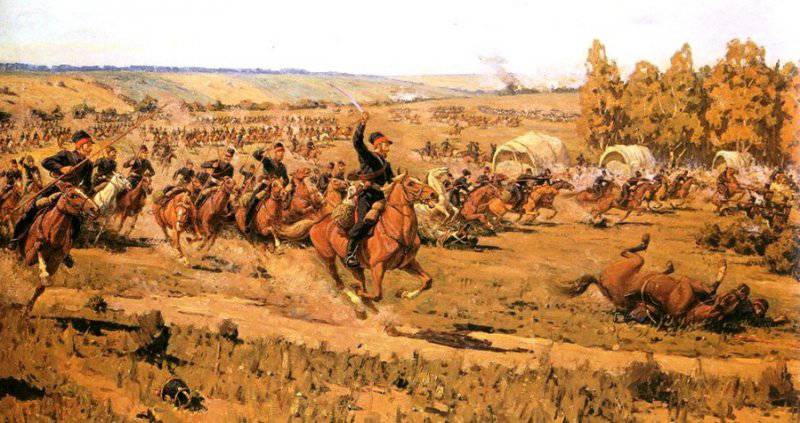
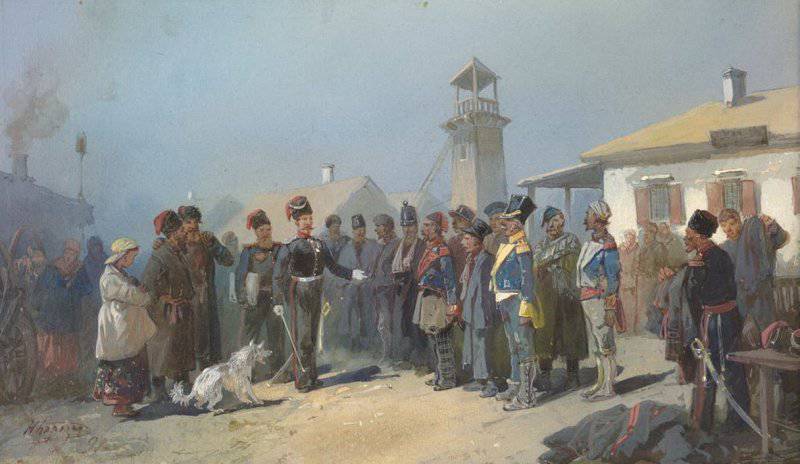
Information